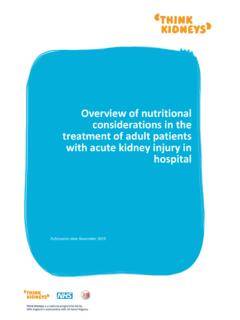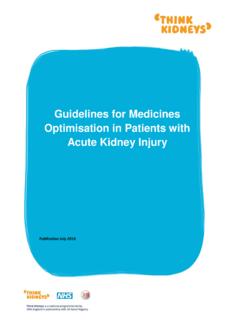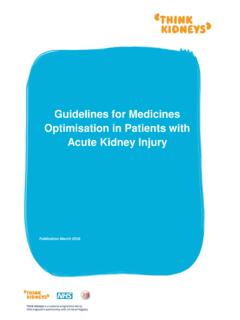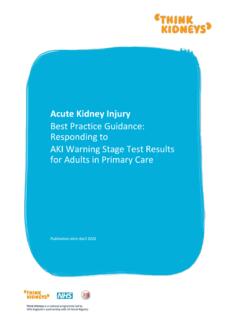Transcription of “Sick day” guidance in patients at ... - Think Kidneys
1 1 Version 9: January 2018 Sick day guidance in patients at risk of acute Kidney Injury: a Position Statement from the Think Kidneys Board As health professionals one of our key aims is to reduce the risk of avoidable harm to our patients . Some people are at increased risk of acute Kidney Injury (AKI), for example those with Chronic Kidney Disease (CKD), heart failure, or those taking particular medications (1). Many health care professionals provide advice to such patients that certain drugs should be temporarily discontinued during acute intercurrent illnesses, particularly where there is disturbed fluid balance.
2 This advice is commonly described as sick day rules , similar to those provided to patients with diabetes treated with Insulin. This Position Statement refers to such guidance given to patients when they are well, about how to manage their own medication should they become unwell. It does not relate to clinical management of known or suspected AKI by health care professionals. The definition of acute illness in this context has to be simple enough to be understood by patients at risk.
3 The NHS Highland definition (2) is a good example: when you are unwell with any of the following; vomiting or diarrhoea (unless minor) fevers, sweats and shaking There are three main reasons for providing such advice: 1. Non-steroidal anti-inflammatory drugs impair renal autoregulation by inhibiting prostaglandin-mediated vasodilatation of the afferent arteriole and may increase the risk of AKI. 2. Drugs that lower blood pressure, or cause volume contraction, might increase the risk of AKI by reducing glomerular perfusion.
4 These drugs include: a. ACE inhibitors (ACEI) and Angiotensin Receptor Blockers (ARBs), which reduce systemic blood pressure and also cause vasodilatation of the efferent arteriole, further reducing glomerular perfusion pressure. 2 b. Diuretics, which can cause a reduction in GFR if their use results in hypovolaemia. This group also includes the mineralocorticoid receptor antagonists spironolactone and eplerenone, used frequently in heart failure. c. Other blood-pressure-lowering drugs, which will lower systemic blood pressure.
5 3. Drugs might accumulate as a result of reduced kidney function in AKI, increasing the risks of adverse effects. These drugs include: a. Metformin, accumulation of which may be associated with an increased risk of type A lactic acidosis in high risk patients . b. Some sulfonylurea drugs, accumulation of which increase the risk of hypoglycaemia. c. Trimethoprim, which increases the risk of hyperkalaemia. This drug also interferes with tubular creatinine secretion, and therefore causes a rise in creatinine levels and may result in a false positive diagnosis of AKI.
6 Although the NICE AKI guideline (3) advocates provision of sick day guidance , the evidence that provision of such advice reduces net harm is very weak. The major evidence comes from observational studies and case series that demonstrate an association between receipt of ACEI, ARBs and NSAIDs (particularly in combination, ACEI plus NSAID), and a risk of AKI during acute illness, particularly urine infection (4, 5, 6). However, these studies may be confounded by indication.
7 For example patients receive ACEIs or ARBs because they have a pre-existing condition heart failure with a poor cardiac output - that is independently associated with an increased risk of AKI; and are clearly subject to publication bias. The largest available study, using a UK primary care dataset, showed only a small increase in the risk of AKI during receipt of an ACEI or ARB compared to receipt of other antihypertensives (adjusted relative risk , 95% confidence interval ), with lower risks associated with ACEI/ARB treatment in the populations at greatest risk.
8 For instance, the relative risk of AKI during ACEI/ARB treatment amongst patients with pre-existing chronic kidney disease stage G4 was (95% CI ) (7). There are potential harms associated with widespread provision of sick day rules or guidance , particularly when the patients have not been clinically assessed and where it is unclear at what level of ill health the medication should be discontinued. These include: 1. decompensated heart failure when drugs blocking the RAAS system and diuretics are discontinued.
9 2. acute kidney injury caused by right-sided congestion complicating withdrawal of diuretics, particularly in right heart failure. 3. Development of poorly controlled hypertension with cessation of antihypertensive medication. 4. Reduced adherence to drug treatment which may have been incorrectly described as nephrotoxic . patients may consider that the potential harm outweighs the potential benefit and decide to stop taking the drug permanently, even in the absence of, or after recovery from, an acute illness.
10 5. patients may over-interpret the advice and stop their drug treatment during even minor illnesses. 6. patients may not re-start their drug treatment on recovery. 7. The drugs may not be titrated back to the previous evidence-based levels even when 3 there has been no evidence of AKI. 8. People may self-manage inappropriately and not seek professional help at an appropriate stage. 9. Making changes to regular medication in patients reliant on dossette boxes is complex and can have unintended consequences.






